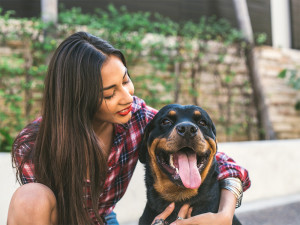Can Dogs Have Acid Reflux?
What to do if yours does.

Share Article
In This Article:
Does My Dog Have Acid Reflux? Symptoms of Acid Reflux in Dogs What Causes Acid Reflux in Dogs? What Can I Give My Dog for Acid Reflux?
If you’ve ever experienced acid reflux yourself, you know the discomfort of that burning sensation in your chest accompanied by pain, frequent burping, or nausea. Our poor pups can also suffer from acid reflux. It can be challenging to identify this problem in dogs, though because the signs tend to be vague and may not be present all the time.
Read on to learn about common signs of reflux and what to do about it.
Does my dog have acid reflux?
Sometimes, it’s hard to put your finger on exactly what’s going on, but if you are getting a sense that your dog is uncomfortable and seems to have some kind of digestive issue, reflux should be a consideration. The signs of acid reflux in dogs can be non-specific, meaning that there is not one obvious sign that points to reflux, but rather a collection of signs that may or may not be present.

Depending on the underlying cause for the reflux, there may be other more obvious signs of digestive upset as well. It can be helpful to keep a log of the signs you notice along with other patterns, including the time of day you notice them, meal times, when they pee and poop, and if they have any other signs like vomiting, coughing, diarrhea, or loss of appetite. Your vet can review this log with you to help make connections between the patterns and look for underlying causes of your dog’s signs.
Symptoms of acid reflux in dogs
There are many possible signs of acid reflux in dogs. This is partly because different dogs express pain differently, and they may react to the reflux differently. Also, depending on the underlying cause for their reflux, their signs will vary. This includes:
Lip-licking: This is a common sign of nausea in dogs. Some dogs also lick their lips when they feel nervous.
Drooling: Drooling is another sign of nausea and pain within the digestive tract.
Teeth-grinding: This is often considered a sign of painopens in new tab, especially pain within the digestive tract
Vomiting bile: Dogs that vomit foam or small amounts of yellowish fluid may be doing so because of irritation from acid production in an empty stomach.
Regurgitating: Regurgitation is different from vomiting but may take some time to be able to recognize the difference. Regurgitation is a passive act, meaning that dogs appear to spit up food or fluid without the active abdominal contractions we see with vomiting. It can be silent, and some dogs will regurgitate and then immediately swallow whatever came up so there may not be any evidence left behind. Regurgitation comes from the esophagus, not the stomach.
Decreased appetite: Dogs with reflux often feel nauseous in addition to having pain in their digestive tract. This can affect their appetite, making them finicky, or resulting in skipping meals completely.
Coughing: The acidic fluid from reflux can sometimes irritate the throat, triggering a cough.
Restlessness and signs of discomfort: Dogs with reflux are often in pain and it may be difficult for them to sleep soundly. They may be more restless, especially when lying down, or show other signs of discomfort like pacing or whining.
Stretching out their neck or hard-swallowing: This can be a sign that their throat is irritated and it hurts to swallow.
What causes acid reflux in dogs?
The basic mechanism of reflux is that acidic fluid from the stomach is able to leak backwards into the esophagus. This can happen for a number of different reasons. Some causes are acute, meaning a short-term problem that resolves quickly, while others may be chronic, meaning they will require long-term management. Some of the common causes of reflux in dogs are:
Slow digestion: Anything that causes food or fluid to sit in the stomach longer than normal can be a risk factor for that fluid refluxing back into the esophagus. Conditions that cause inflammation within the stomach can slow the emptying of the stomach, setting up the conditions for reflux. This includes infections, parasites, or dietary indiscretions like eating garbage or spoiled food.
Medications: Certain medications may cause reflux as a side effect. This can be due to inflammation within the esophagus or stomach, as well as effects on the normal motility and emptying of the stomach. It is a common side effect of anesthesia and surgical procedures, too.
Chronic vomiting: Dogs with underlying medical conditions that cause chronic vomiting often have ongoing inflammation within their stomach and esophagus, which can make reflux more likely.
Brachycephalic dog breeds: Breeds with flat faces have a combination of congenital changes that also affect the shape of their esophagus, making it easier for fluid to reflux from the stomach up through the esophagus. This is known as a hiatal hernia. These breeds also frequently have food allergies and other digestive problems which may cause ongoing inflammation or vomiting in their digestive tract.
Food allergies: This is an example of a chronic condition that leads to inflammation within the digestive tract. This chronic inflammation can be a precursor to reflux.
Overproduction of stomach acids: Some dogs tend to overproduce stomach acids, and this can be more problematic when they only eat once per day. These dogs may also show signs of bilious vomiting syndrome and vomit foam or bile, especially when they have not eaten in many hours. This chronic inflammation from vomiting or excessive amounts of acidic fluid in the stomach can also lead to reflux.
Other underlying digestive problems: There are many other medical conditions that can affect the esophagus and/or stomach, leading to reflux. This may include megaesophagus, stomach or esophageal cancer, certain parasites, congenital problems with the esophagus or stomach, trauma to the esophagus caused by sharp bones or other foreign material, or other neurologic conditions.
What can I give my dog for acid reflux?
If you suspect acid reflux, it is important to see your vet for a thorough exam and diagnostic tests to look for the underlying cause. While you can try to make certain changes at home to reduce your dog’s reflux, many dogs will need prescription medications in order to get relief from their discomfort. Common treatments for reflux are:
Diet and lifestyle changes: Start by making sure to feed your dog small, frequent meals instead of one large meal per day. Stick with one formulation of dog food and temporarily eliminate treats and table scraps. Incorporate regular exercise into their daily routine and work with your vet to address other health issues like obesity or joint disease that may reduce their mobility. Dogs with underlying food allergies may need a prescription hypoallergenic diet in order to avoid their allergens.
Antacids: Over-the-counter antacids are not recommended for dogs with reflux. Many do not work at all for dogs, and others can be unhealthy or toxic to dogs. Your vet may prescribe specific medications that help to reduce stomach acid or improve motility of the digestive tract depending on your dog's signs.
Treatment of underlying conditions: Whenever possible, targeting the underlying cause of the reflux is crucial to curing the reflux and bringing your dog permanent relief. Be sure to consult your vet if you suspect reflux and to mention any other signs or changes you have noticed with your dog.
When to seek expert help
It is always a good idea to consult a vet any time your dog has changes in their behavior or health. This is especially true with reflux because the signs can be so vague and you may just have a feeling that something is wrong without being able to pinpoint exactly what it is. Seek veterinary care right away if your dog is experiencing other concerning signs like a decreased appetite, weight loss, vomiting, coughing, drooling, or lethargy.
Bottom line
Dogs can and do suffer from acid reflux, just like people.
It can be difficult to identify reflux in dogs because the signs will vary from one dog to the next and they may come and go.
Be sure to consult a vet to get the most effective treatment for reflux and determine the underlying cause of your dog’s reflux.
References
Han, Jihee, et al. “Treatment of Gastroesophageal Reflux Disease in 2 Young Dogsopens in new tab.” Journal of Veterinary Clinics, vol. 38, no. 5, 31 October 2021, pp. 231-234.
Marks, Stanley. “Oesophageal Disorders In Dogs - More Common Than You Think!” University of California, Davis, School of Veterinary Medicine,
Muenster, M, et al. “Gastro-oesophageal reflux disease in 20 dogs (2012 to 2014)opens in new tab.” Journal of Small Animal Practice, vol. 58, no. 5, May 2017, pp. 276-283.
Savvas, Ioannis, et al. “Factors Affecting Intraoperative Gastro-Oesophageal Reflux in Dogs and Catsopens in new tab.” Animals, vol. 12, no. 3, 20 January 2022, pp. 247.

Dr. Amy Fox, DVM
Amy Fox, DVM is a small animal veterinarian in New York City with over thirteen years of experience in a mixture of general practice, emergency medicine, and shelter medicine. A lifelong animal lover, Dr. Fox studied biology in college and then worked as a veterinary nurse before pursuing veterinary school at Cornell University. Her expertise includes surgery, dentistry, and management of chronic conditions, and she is interested in toxicology, pain management, nutrition, care of senior pets, and educational outreach. Dr. Fox also enjoys writing about veterinary medicine and teaching, and her work has previously appeared in Spruce Pets. In her free time, she loves to cook, garden, go for long runs, and hang out with her goofy mixed-breed dog May, who provides never ending comic relief!
Related articles
![Woman kisses her black pit bull dog on the head.]()
What Can I Give My Dog for an Upset Stomach?
It stinks to see them uncomfortable. Here’s what you can do.
Why Does My Dog Keep Licking Their Lips?
It’s not always just because they want whatever you’re eating.
![Young woman is hugging her Rottweiler dog while they sit outside on the street.]()
Can Dogs Get Hiccups? Why It Happens and What to Do
In addition to being adorable, it’s nothing to worry about.
![dog cuddling their pet parent on the couch]()
Why Does My Dog Throw Up Yellow Bile?
It’s not a pretty sight, but it’s important to know what’s going on.
Can Dogs Get a Stomach Bug?
No one likes it when their tummy hurts.
Can You Give Dogs Tums?
Learn what’s safe to do when they have tummy troubles.








